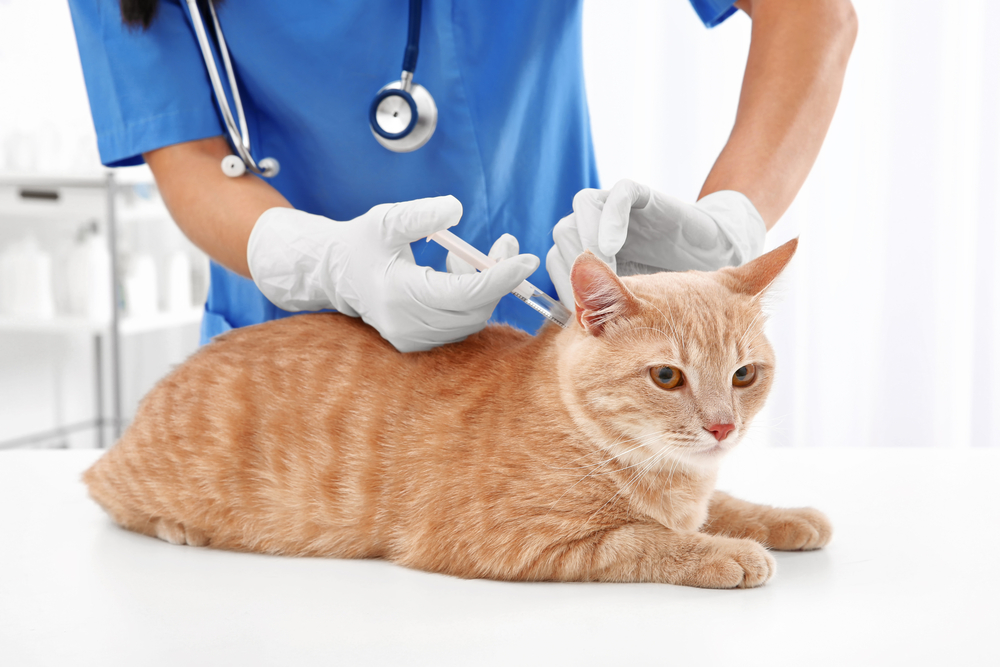Vaccines are a normal part of responsible pet ownership for Driftwood Animal Hospital clients—but do you know the diseases your pet’s “shots” protect them against? This information can help you understand the veterinarian’s recommendations and make informed decisions about your pet’s health.
To each their own—customized pet vaccine protocols
No two pets are alike—including those of the same breed, lineage, or home. Our Driftwood Animal Hospital veterinarians consider each pet’s lifestyle, health, exposure risks, and age when determining vaccine recommendations. This approach ensures your pet’s immune system is equipped to fight against certain diseases, but your pet does not receive unnecessary vaccines.
Peace of mind protection—infectious disease prevention in pets
Vaccines provide your pet with powerful protection against life-threatening diseases and you with priceless peace of mind. Our Driftwood Animal Hospital team vaccinates pets against several life-threatening diseases, including:.
- Rabies virus in pets
Rabies is a deadly virus that is found in wild and domestic animals worldwide. Rabid animals experience a progressive illness as the virus travels from the nerves to the spinal cord and brain. Signs include behavior changes (e.g., unexplained aggression, mental dullness) and progressive paralysis. After reaching the brain, the virus travels to the salivary glands and is transmitted through bite wounds.
Rabies is a zoonotic virus (i.e., the disease can be transmitted from animals to people) and is almost always 100% fatal once clinical signs appear. Rabies is therefore a serious public health threat and one- or three-year vaccinations are mandatory for domestic pets.
- Parvovirus in dogs
Canine parvovirus is a highly infectious virus that attacks rapidly dividing cells, including those in the gastrointestinal tract, lymphatic tissue, and bone marrow. Puppies are most frequently affected, although any unvaccinated dog is susceptible. Early signs include lethargy, appetite loss, vomiting, and diarrhea, which may be bloody. Rapid hospitalization and supportive care can improve survival rates, but sadly, parvovirus is frequently fatal.
Because parvovirus particles can survive for months in the environment, puppies should receive the complete vaccination series to ensure reliable protection. Adult dogs are vaccinated every one to three years.
- Distemper virus in dogs
Like canine parvovirus, distemper is highly infectious among puppies and unvaccinated dogs. The virus spreads through aerosolized droplets to the respiratory, gastrointestinal, and central nervous systems. Signs include fever, lethargy, eye and nasal discharge, loss of appetite, and neurological signs, such as muscle twitching and seizures. Supportive care, including intravenous antibiotics, medications, and fluids, is crucial for survival.
Puppies should receive the complete vaccination series for comprehensive protection against distemper virus. After a booster vaccination at 12 months of age, dogs can be vaccinated or titer tested every three years.
- Lifestyle vaccines for dogs — The following vaccines are considered elective and may be recommended, depending on your dog’s exposure risk. They include:
- Bordetella — This self-limiting upper respiratory illness is commonly spread in dog-friendly facilities (e.g., boarding and training kennels, grooming facilities, day care).
- Canine influenza (H3N2 and H3N8) — This flu-like virus causes only mild signs in healthy dogs, but can lead to pneumonia in severely affected pets.
- Leptospirosis — Leptospirosis is shed by infected animals—especially wildlife—through their urine, and is commonly transmitted through contaminated water and soil. Leptospirosis can lead to acute kidney failure.
- Lyme disease — This tick-borne bacterial infection causes painful joint swelling, lameness, fever, and in rare cases, kidney failure.
- Feline panleukopenia in cats — Panleukopenia (i.e., feline distemper) is a devastating virus that, until vaccination became standard practice, was the primary cause of kitten death. This highly infectious virus is resilient, and can survive for more than a year in some environments. Panleukopenia is transmitted through body secretions or across the placenta and causes rapid deterioration in kittens and unvaccinated adolescent cats, and sudden, unexplained death. Successful treatment requires aggressive therapy to correct dehydration, anemia, protein loss, and secondary infections.
Kittens should receive the FVRCP vaccination, which is a combination vaccine (i.e., one that protects against more than one disease—see below). They should be vaccinated at regular intervals, beginning at 6 to 9 weeks of age, with a booster vaccine at 12 months. Then, the vaccine interval may be extended to every three years.
- Feline calicivirus and viral rhinotracheitis — Feline calicivirus and viral rhinotracheitis (FVR) are included in the FVRCP vaccine at Driftwood Animal Hospital. These viruses are rapidly spread through respiratory droplets and contaminated objects in large-volume cat facilities, such as veterinary clinics, animal shelters, and grooming and boarding facilities.
Although the viruses are generally self-limiting, infected cats experience uncomfortable respiratory congestion and secondary infections, and may refuse to eat, because calicivirus commonly causes painful oral ulcerations. FVR may recur in response to stress.
Vaccination recommendations include a complete FVRCP vaccination series for kittens, with an additional dose at 12 months of age. Vaccinated adult cats should receive booster vaccines every three years.

- Feline leukemia virus in cats (FeLV) — Feline leukemia virus is a common infectious disease among cats that is transmitted through prolonged close contact with infected secretions, such as mutual grooming or direct contact (e.g., a bite wound). Kittens are the most susceptible to FeLV, especially when they share living space with untested cats. The virus can remain dormant for many years before emerging and causes a gradual but progressive health decline.
The FeLV vaccine does not ensure 100% protection, and is not considered a core vaccine by some experts, but vaccination, and preventing exposure to infected cats, is still the best way to protect your kitten or cat. Two-dose FeLV vaccination is advised for kittens. Adult boosters are recommended on an as-needed basis.
Is your pet protected from these contagious diseases? If you’re unsure about your dog or cat’s vaccine status, contact Driftwood Animal Hospital. Our caring team will review your pet’s records and schedule an appointment for the necessary updates.








Leave A Comment